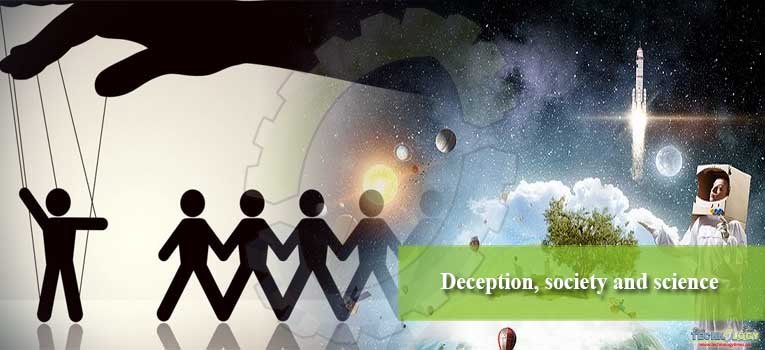Deception is described here in relationship with different fields of knowledge, including science and technology.
 Deception is an illegal or immoral scheme to get what one wants. There are five common types of deception: (1) Lying, (2) Creating an ambiguity, (3) Omission, (4) Exaggeration, and (5) Understatement.
Deception is an illegal or immoral scheme to get what one wants. There are five common types of deception: (1) Lying, (2) Creating an ambiguity, (3) Omission, (4) Exaggeration, and (5) Understatement.
Social and interpersonal deceptions are quite common in all societies worldwide. Newspapers and television channels report deception stories every day. These news range from lying about private affairs to big bank frauds.
Normally, deceptions make sensational headlines in print and digital media around the world and people follow these news with interest over long periods of time. Examples of deceptions are unlimited.

Deception is bad for both individuals and the society. It creates lack of trust among people. In the worst cases, individuals lose trust in the society. Deception degrades the society ethically. Deception and resulting frauds adversely affect the economic progress of the society or the state.
Deception is normally linked to different types of manipulation. Manipulation means the skillful or clever handling or use of something or someone.
Most important types of manipulation are: (1) Belief manipulation, (2) Desire manipulation, and (3) Relationship manipulation. Broad and increased level of literacy in a society can limit deception and manipulation.

Deception has been addressed in a number fields. Most important of them are philosophy, law, psychology and sociology. Recently, deception is being studied using a branch of mathematics, called game theory
Game theory helps in modeling different aspects of deception, which are planning, execution and mitigation of effects of deception. Game theory based state network, equipped with cyber technology, can limit deception and its implications in modern society.
Science based deception tracking is quite established at the laboratory scale, but it is not yet accepted as an evidence in real world situations or in the court of law. When one lies, changes occur in different parts of his/her brain, which affects blood pressure profile of the brain.
Changes in the brain, during lying, can be measured by placing electrodes on participant’s scalp. Electrodes are used to understand/measure event or deception related electrical signals on the surface of the brain. These signals link the deception or truth telling to the brain activity.
New eye trackers, brain scans and MRI are being developed for deception detection. This technology and related research findings will help police and investigators in catching liars and criminals. Lying and deception will be more and more difficult in coming time due to advances of technology.
Traditional deception detection techniques assume that liars will exhibit stress based behavior. These techniques are less precise. Help from the scientific/medical analysis and modern technology are essentially needed here to implement transparent justice.

Lesson: Deception tracking technology is established at the laboratory scale and may be accepted in the court of law as an evidence in the near future.
Declaration: Information presented here for a broad scope readership is collected from several in-print and digital sources.
Author email: rana@alumni.nus.edu.sg